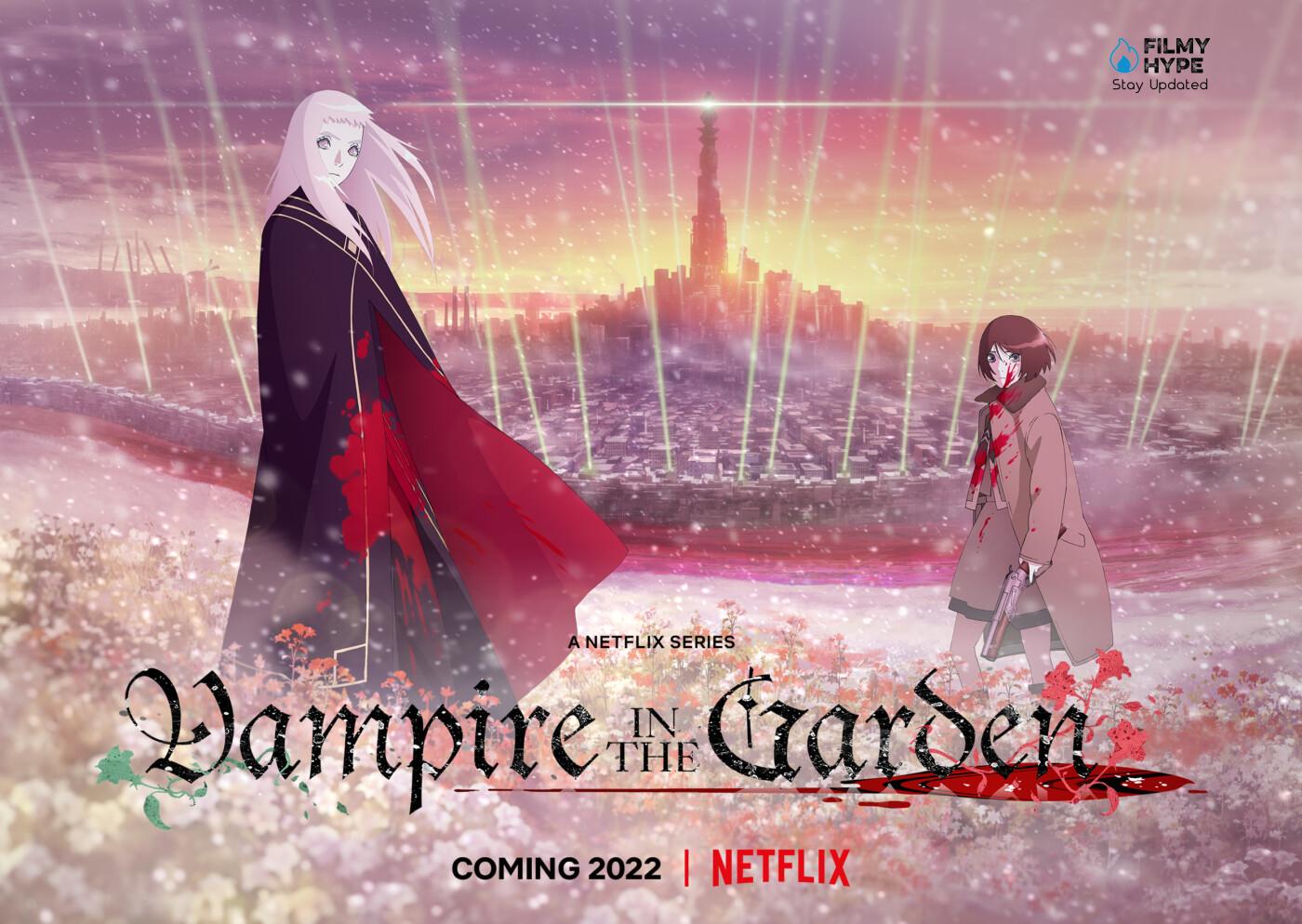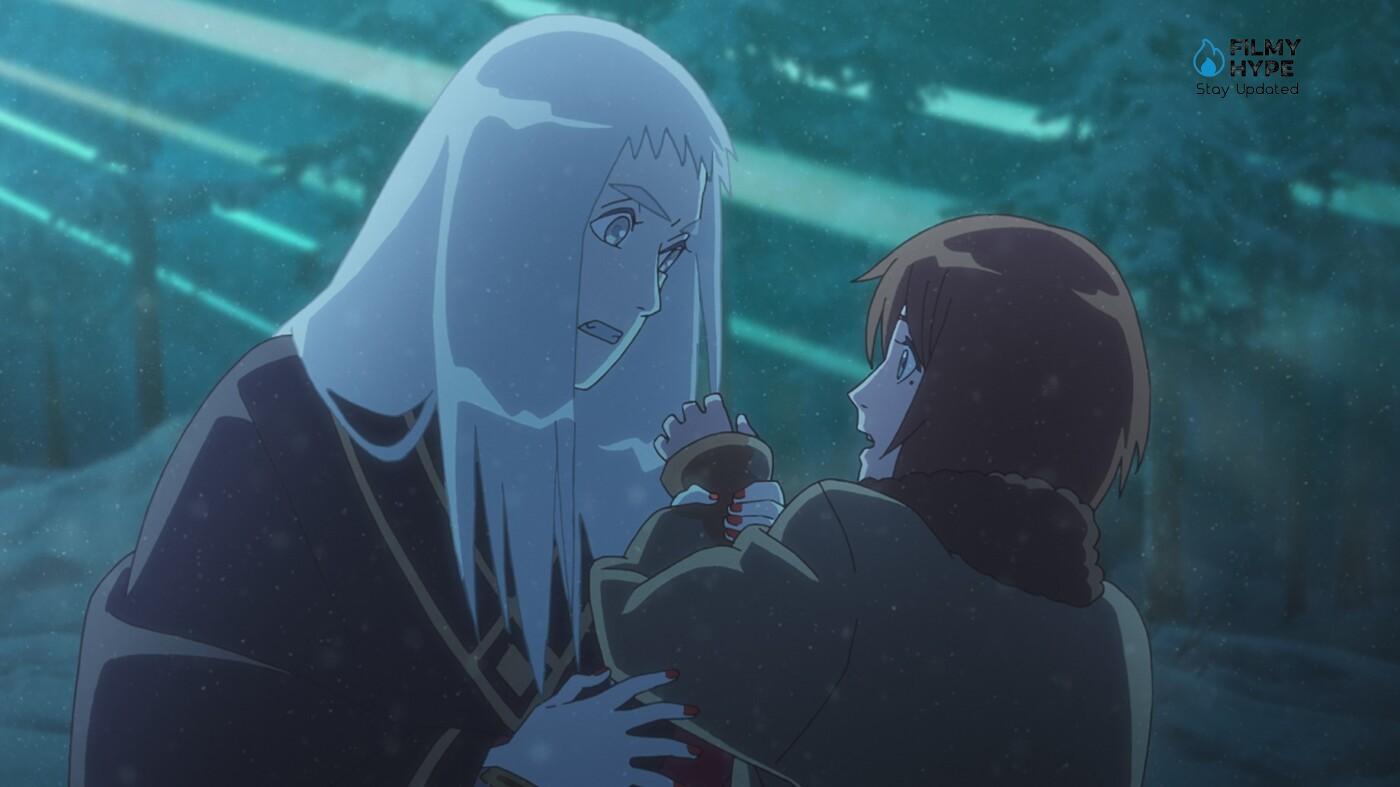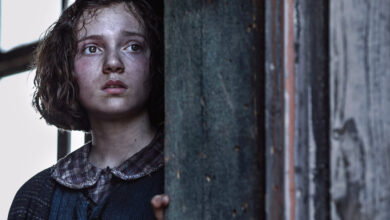Vampire In The Garden Review: An Exciting Fantasy Anime On Netflix Read Full Review
Starring: Megumi Han, Yu Kobayashi, Chiaki Kobayashi
Director: Ryotaro Makihara
Streaming Platform: Netflix (click to watch)
Filmyhype.com Ratings: 3.5/5 (Three and half stars)
After the debut of Bubble, the animation studio WIT returns to Netflix with the first season of a brand-new series. Vampire in the Garden, an original work directed by Ryotaro Makihara, is one of the most anticipated new anime for May 2022. The only 5 episodes of which the series is composed, each lasting about 25 minutes. A very short anime – perhaps too short – to watch in one go.

Vampire In The Garden Review: The Story
In an unknown place shrouded in cold winter, the last human beings seek to rid the world of vampires, who once slaughtered humanity. A towering tower generates beams of light to ward off these fearsome creatures, and activities such as singing and music are banned, to prevent enemies’ fine hearing from luring them to one of the few cities left standing. Little Momo, daughter of the General, is trained to fight against vampires. Her life, monotonous and narrow, is suddenly turned upside down by a mysterious encounter. She finds herself face to face with the Queen of vampires, named Fine, who however is not like all the others.
You have given up on feeding on human blood, as opposed to the long battle that is shaking the whole world. She desires to return to live with humans: this was possible in a place called Eden, and Fine would like to find it to live in harmony. Even Momo, not without fear and hesitation, is driven by the same will. This is where she begins a difficult journey to search for this Earthly Paradise. As expected, not everything will go exactly according to plan.

The 5 episodes of which Vampire in the Garden is composed are certainly few, but sufficient to develop the story, or at least its essential points. They are, to all intents and purposes, a short journey, not just in a literal sense. Fine and Momo, united by the same goal, undertake a journey together, under the banner of a topic seen and reviewed: the possibility that two historical enemies live in harmony with each other. From this perspective, the first engine of the story is not so original, and this also implies certain predictability of events. However, there is no lack of small twists. As mentioned, the two unusual adventure companions move from one place to another in search of Eden, encountering various difficulties dictated by the rivalry between the two species, of which the rest of the world is still a victim.
A sincere relationship that gradually manages to excite and sometimes even move. This aspect is the fundamental cornerstone of anime. The journey of the two young women is also metaphorical. It is the passage from one condition to another, from oppression to freedom. As in any conflict, each side believes that the other is the primary cause, and mutual hatred results in mass destruction to free each people from the enemy. Well, this is not the liberation that Momo and Fine have in mind. Both are tired of this spasmodic search for peace through war and chase the dream of a distant, almost utopian place, devoid of hatred and battles.
Vampire In The Garden Review And Analysis
The new Netflix anime is in effect a dark fantasy tale. We do not know the exact period in which it takes place, but from the army clothing, it can be deduced that it is the 40s of the twentieth century, a more than plausible supposition if you think of a possible reference to the Second World War. This hypothetical periodization welcomes some doubts when vampires enter the scene for the first time. These creatures, first, quite faithfully reflect the traditional imagery of the 18th and 14th centuries.
Sumptuous clothes, large mansions like the rooms of a castle, with period furniture. The reason for this obvious gap is not clear, and it risks confusing the viewer. It can be assumed that it is a mere reference to the figure of the vampire to which the public is accustomed, while historical credibility is placed in the background. This apparent crystallization of creatures breaks when, for example, Fine listens to a vinyl record or drives a vehicle, aspects that clash with the eighteenth-century and nineteenth-century ideas served up most of the time.
The style of Vampire in the Garden changes abruptly from one episode to another. We are witnessing a war story and a gothic novel at the same time, while the sequence of the journey is very reminiscent of the on the road genre, with hilarious interludes and a folk piece in the background. Music, among other things, is an element that often returns within the narrative. Yoshihiro Ike creates a soundtrack capable of immersing the viewer in the right atmosphere, whether it is a dark sequence or another particularly exciting or moving one. The only exceptions, therefore, are precisely those sporadic passages that interrupt the general tenor of the work, creating occasions for an inhomogeneity that is difficult not to notice.
As mentioned initially, WIT had already made its first reappearance on Netflix with an animated film directed by Tetsuro Araki: we invite you to recover the Bubble review. The new fantasy series, albeit differently, quite meets expectations. The first episode begins immediately with an action and combat scene, in which the technical value of WIT emerges. Perhaps in a less obvious way than in Bubble, here too we see the hand of animations already used for Attack on Titan.
The direction and photography, however, decide to enrich this sort of “pre-set scheme” with choices that also involve the point of view. An example of this is one of the initial shots, which sees the imaginary camera in front of the barrel of a gun, and allows the viewer to feel, firsthand, the target of a large bullet racing towards him. The strong dynamism of the animations is flanked by an aesthetic refinement that invests a large part of the work. Unlike what often happens when you focus little on the depth of field, the different backgrounds in which the characters move are the result of careful work.
Often, they seem almost like paintings, just like those that fill the homes of vampires, another opportunity to highlight an accurate artistic commitment that embellishes some episodes. On the other hand, it must be remembered that these creatures are depicted as cultured living beings, lovers of culture in all its forms, a characteristic that is attributed to the legendary Count Dracula. Everywhere there is particular attention to the smallest details: not only the meticulous realization of the works of art but also of the photographs, the pages of the books, and the covers of the vinyl (on which the title and artist are legible). Somehow, if one remains focused on the crystallization to which vampires are subjected, every element within it is inserted in an atmosphere coherent with itself.
Finally, WIT decides to sacrifice the pure gore aspect of vampire hunting by favoring more evocative moments. Although it is a work in which violence, blood, and death are fundamental elements, it is sometimes chosen to sweeten the rawest aspect of Vampire in the Garden, with the skillful help of the director. The anime does not give in to the horror typical of this mythology, it has already been saying: that this short season is a hymn to other values (freedom, friendship beyond all barriers) and becomes a vehicle for messages other than those that a mere bloodbath can offer. Worthy of attention, we said, are those moments that aim to influence the viewer, through twisted flashbacks and disturbing visions, in which the shots seem to interpenetrate, giving life to an almost hallucinatory atmosphere. The intention is not to confuse the viewer, but to capture and immerse him in it, stirring up feelings and emotions.
Vampire In The Garden Review: The Last Words
Vampire in the Garden wants to tell the exciting story of a great friendship, capable of hindering every barrier. A topic certainly not unpublished, but that manages to capture the viewer’s attention. Despite a mixture of styles that threatens to alienate the viewer, this series enjoys a valid artistic sector, which aims at the rendering of a very specific imaginary, when this is not confused with characters that differ a little from it. Overall, the first and only season of Vampire in the Garden is a pleasant and at times heartwarming product, with little flashes of mystery and darkness that fans of dark fantasy will appreciate.






